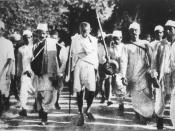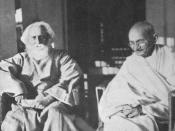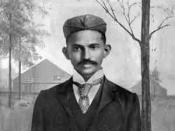Born in 1869 and raised in Gujarat, Mohandas Gandhi was one of the foremost men to help lead the nationalist movement. Gandhi is probably the best known proponent of passive resistance and this idea helped him to achieve the goal of Indian nationalism. His inflexible self-control helped him to be the great leader that his is known as today and helped to fuel his fire for a new India.
Gandhi studied law in London and then went to South Africa to work as a lawyer for Indian immigrants. He then returned to India and set up a nonviolent movement based on his experiences gained from South Africa. His goal was to free India from British rule and to gain self-respect and confidence for his people. He believed adamantly in a few things, one, passive resistance, two god as a creator and not as a religion, and three, the return of India to its roots.
His actions of passive resistance presented a great force upon the British. Although hard to control at times, the idea eventually worked in the end. Gandhi practiced protesting, fasting, and the boycotting of British goods. To accomplish the last he made his own clothes that were simple and made from hand-woven wool. The spinning wheel was one of the symbols used in his fight for India.
Gandhi gave new life to the old idea of nationalism indeed. He helped to spark the fire that once was weak and now burned brightly. By his actions and protests and rallies for nationalism, he helped to try to unite Muslim and Hindu against their oppressors. Gandhi gave speeches on god attempting to show him as one entity as opposed to being separate through religion. These speeches helped to give Muslims and Hindus common ground on which to fight. The...


